How Nuch Feed Does a Full Grown Laying Hen Need Per Day
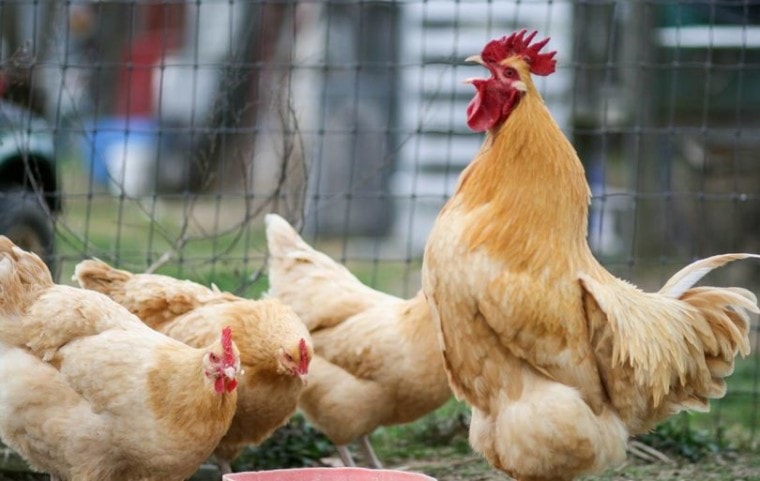
Introduction
Chickens are great additions to both traditional and urban farms. They help with pest control and produce enough eggs that many people sell them or give them away. Chickens are also foragers by nature, so they will happily spend the entire day pecking around for something to eat. There are a ton of food options for chickens, allowing you to provide them with a healthy diet and fun treats as well. Here are the things you need to know about feeding your chickens!

What to Feed Chickens
Feeding your chickens doesn't have to be complicated! Chickens aren't usually picky eaters and you may have more trouble keeping them from eating things they shouldn't eat than finding things they can eat. A healthy diet will stimulate healthier egg production and improve immunity.
What to Feed Your Chickens:
- Commercial Feed: Commercial poultry pellets should make up the base of your chickens' diet. These pellets are formulated to meet the nutritional needs of chickens and will ensure they're getting everything they need without having to forage. This is especially important for chickens that can't free roam in a large area since food may be limited in a condensed area. Commercial feeds are usually made with foods like sunflower seeds, oats, and wheat.
- Grasses: Chickens will eat broad-leaved weeds, like dandelions, and they will eat grasses like clover and Kentucky bluegrass.
- Insects: Chickens love to eat bugs and are very effective at helping to control populations of ticks. They will also eat earthworms, beetles, and crickets.
- Seeds and Grains: Chickens will eat pumpkin seeds, oats and oatmeal, corn, and cooked rice are all good options to feed your chickens. Just feed these in moderation as they tend to be very nutrient-dense.
- Grit: To help digest their food, chickens need to eat grit like sand or coarse dirt. The grit will help the gizzard grind up the food, making it easier to digest and to pull nutrients from.
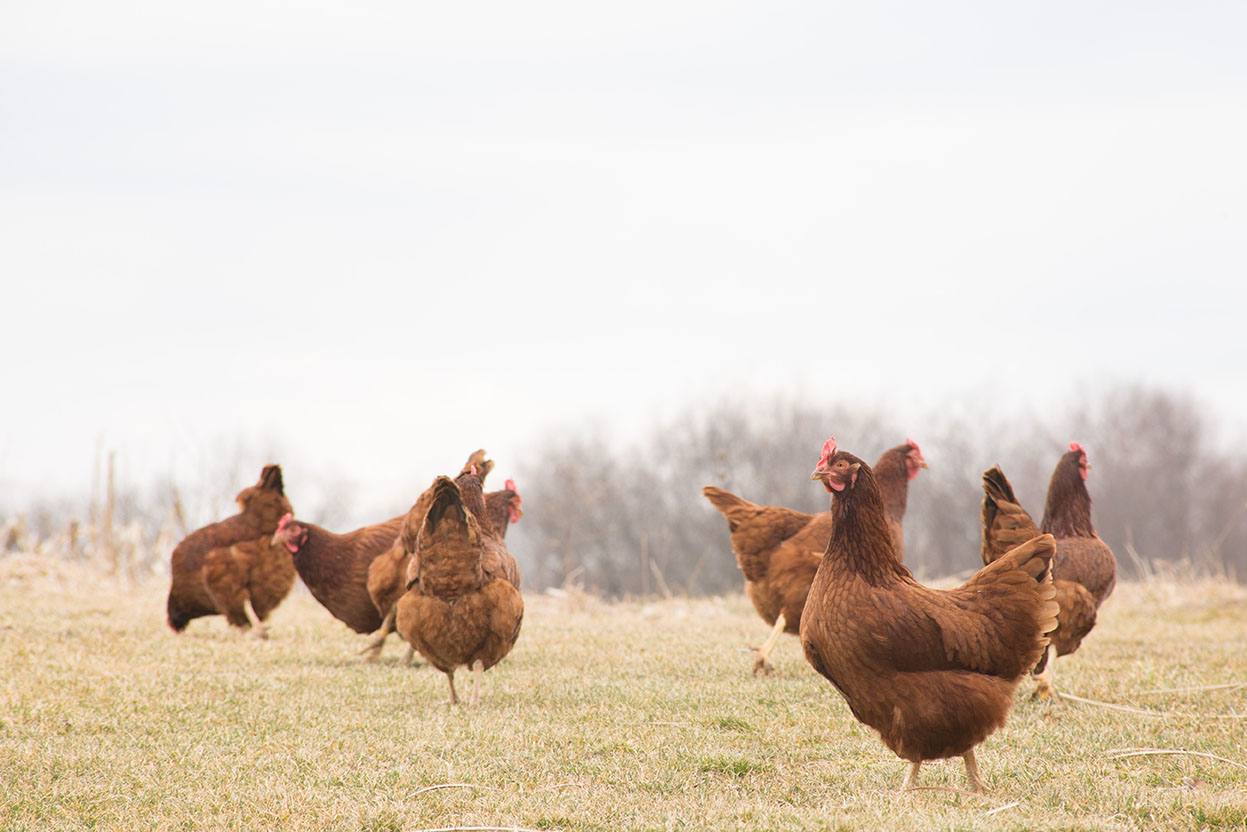
Treats for Chickens:
- Vegetables: Chickens love veggies and will gladly accept whole veggies as well as vegetable peels. Broccoli, cauliflower, zucchini, bell peppers, and tons of other veggies are chicken-safe. Avoid feeding raw potatoes and potato peels, as well as other nightshades, as these can make your chickens sick. Veggies can be fed on a daily basis.
- Fruits: Bananas, apple cores and peels, melons, and grapes are good options, as well as other non-citrus fruits. It's best to remove seeds from apple cores prior to feeding since apple seeds contain small amounts of cyanide.
- Mealworms: Mealworms are available in freeze-dried and live forms, so you will be able to choose which to feed your chickens. They will happily eat either one, though!
- Table Scraps: Chickens will eat just about anything you offer to them. Pancakes, pasta, leftover oatmeal, and unusable scraps from produce like cores and peels. Feed table scraps in moderation and make sure to cut everything up into bite-sized pieces before feeding it to your chickens.
- Protein: Chickens are omnivorous, so feeding them meat can be beneficial to their diet. They don't need a lot of meat but will often catch frogs and other small animals when possible as a snack. Chickens also can have some dairy, like cottage cheese, in small quantities. Meat and dairy proteins should be fed in moderation.
What Not to Feed Your Chickens:
- Beans
- Raw Potatoes
- Onions
- Citrus
- Candy
- Rhubarb
- Avocado
- Ginger
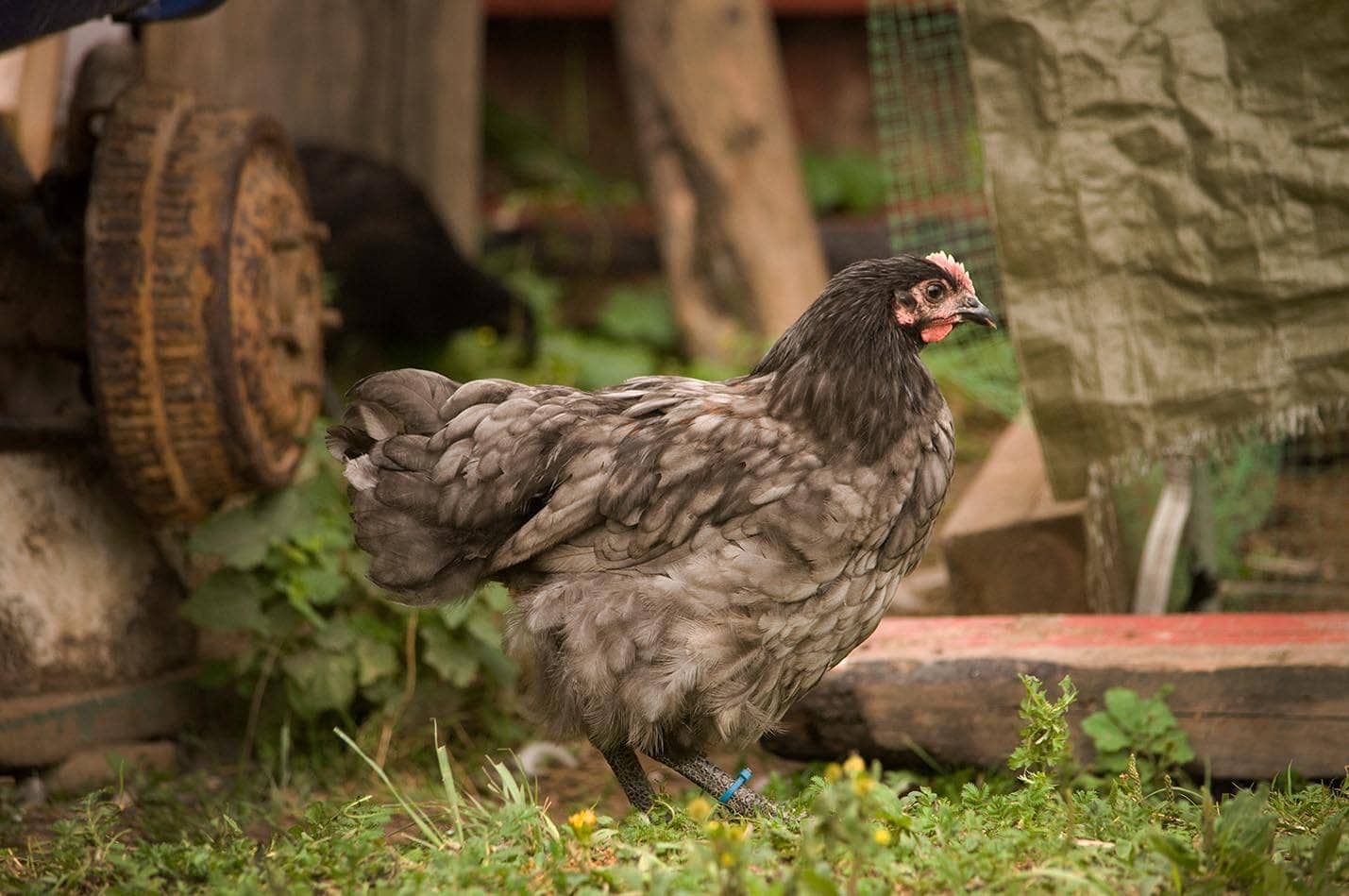
Chicken Feeding Chart
Age in Weeks Amount per Chicken per Day 1 .42–.53 ounces (12–15 grams) 2 .53–.74 ounces (15–21 grams) 3 .74–1.2 ounces (21–35 grams) 4–6 1.2–1.7 ounces (35–50 grams) 7–8 1.9–2.1 ounces (55–60 grams) 16–27 2.4–2.8 ounces (68–80 grams)
Source: https://nation.africa/kenya/business/seeds-of-gold/diary-of-a-poultry-farmer-feeding-regime-for-chicks-important-424692

How Often to Feed Chickens
Ideally, you should split your chicken's feed into two servings daily. If you're home during the day, you can even make this 3-4 small feedings. Chickens enjoy small, frequent meals as opposed to large meals once a day. It's best to feed your chickens their pellets in a feed trough of some sort for easy cleaning but treats and scraps can be tossed on the ground to provide an enriching hide-and-seek game for your chickens. Just make sure you're not overfeeding or you may end up with leftover rotting food.
A major benefit of feeding small meals twice daily is that it decreases the risk of attracting pests from food left sitting in the feed trough. Pick up any unfinished food at night to avoid attracting mice, possums, and other pest animals.
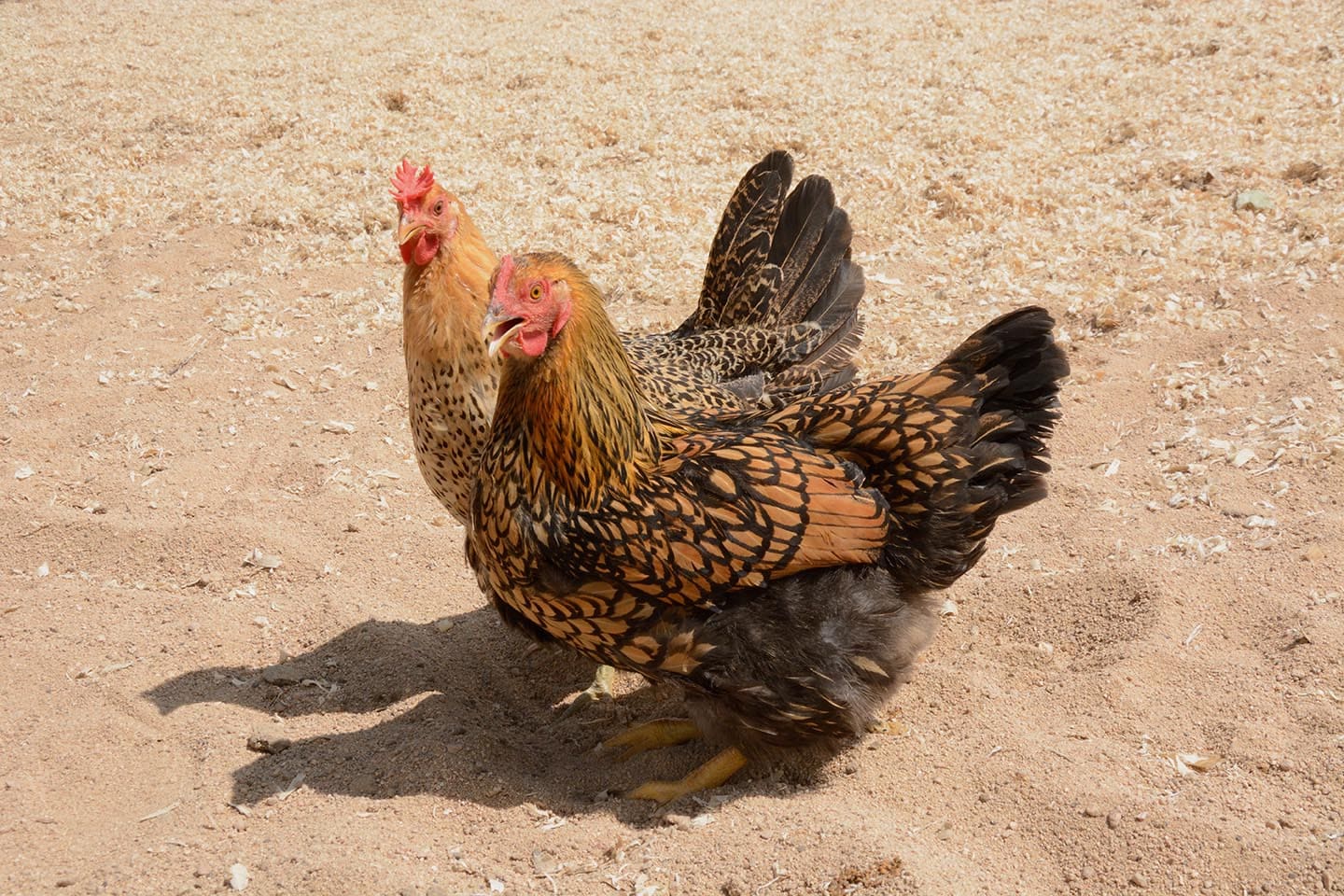
The Importance of Water in a Chicken's Diet
Basically, all living things require water in some form for survival, and chickens are no different. They should always have access to clean water to prevent dehydration. A single chicken can drink up to a liter of water daily, and sometimes will drink even more during hot weather. Take this into account when you're filling up your chickens' waterer, and make sure to account for environmental factors like evaporation.
You should be providing clean, fresh water to your chickens at least twice daily and your container should hold enough water for the number of chickens in the flock. Your chickens should never lose access to water, so make sure you are giving them plenty! Dehydration, decreased egg production, stunted growth, and general poor health can all result from not having adequate water.
What Additional Supplements Do Chickens Need?
Sometimes, chickens are not able to fully absorb and make use of the nutrients in their food, so supplementation may be necessary. Not all supplements are needed all the time, but here are some supplementation ideas for you to keep your chickens healthy.
They should be provided with a source of grit, especially if they are not free range. Free range chickens often pick up gravel and dirt as they roam, fulfilling their grit needs. Chickens also need adequate calcium for egg production, and this can be achieved by feeding them dried eggshells that have been crushed or ground into powder. There are also oyster shell supplements available at most feed stores.
During the summer, adding electrolyte supplements into the water may be necessary and powdered electrolytes are usually available at feed stores. Powdered probiotics can be added to your chickens' food to maintain digestive health. Apple cider vinegar may help thin mucus and garlic's antibacterial properties can help reduce the risk of illness, although it may alter the taste of your eggs.
Are Table Scraps Good for Chickens?
Yes…and no! Some table scraps are healthy for chickens, like fruits, veggies, and whole grains. Others are dangerous to their health, like citrus and raw potatoes, and some table scraps aren't necessarily "good" for your chickens, but they'll enjoy eating them.
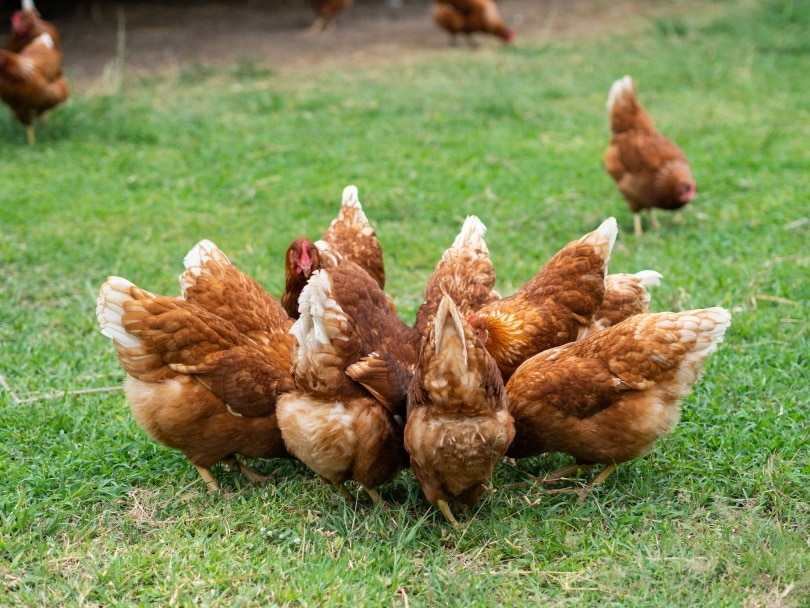
Feeding your chickens table scraps can be a good way to dispose of food that would otherwise go to waste. Chickens are pretty much game to eat whatever you offer, so if you give them pizza, they'll probably eat it. Should your chickens be eating pizza in large quantities or on a regular basis? No.
Feeding your chickens table scraps should primarily consist of healthy, unprocessed foods. Pasta, pizza, and anything else that's highly processed or contains high levels of salt or sugar should be fed in very small quantities on rare occasions or should be avoided altogether.
What to Do if Your Chicken Isn't Eating
If you have a chicken that isn't eating, you can offer things like a mush of commercial feed mixed with warm milk or water. Sometimes, all your chicken needs is to be handfed for a little while, so you can try this as well as attempting feeding via syringe or spoon.
If your chicken continues to refuse to eat or if you have multiple chickens who are suddenly showing inappetence, you should contact your veterinarian immediately. It's possible your chickens may have encountered toxins or poisons and need veterinary care. When in doubt, contact your vet! Veterinarians are happy to answer questions, and many would rather see your chicken before they are very ill. This gives your chicken the best chance of regaining health.

Conclusion
Feeding your chickens can be fun for you and your chickens. They're curious animals and will appreciate experiencing new foods. You can even make feeding a game by doing things like providing a hanging head of cabbage for them to peck at or a block of frozen fruits and veggies to cool off during the summer. The most important thing is that your chickens are healthy and happy!
- Next on your reading list: How Long Can Chickens Go Without Food?
Featured Image: Racheal Carpenter, Shutterstock
Source: https://petkeen.com/feeding-chicken-how-much-how-often/
0 Response to "How Nuch Feed Does a Full Grown Laying Hen Need Per Day"
Post a Comment